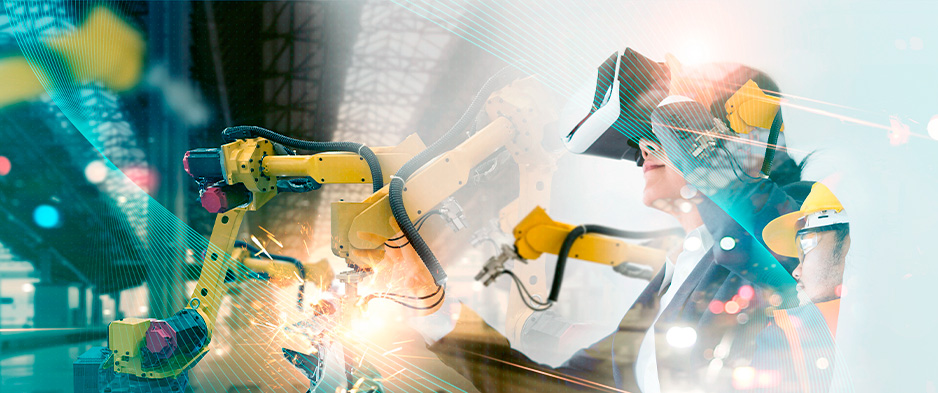The synergy between the Metaverse and Artificial Intelligence (AI) is emerging as a highly relevant technological paradigm. The metaverse, a vast network of interconnected virtual worlds with real-time interactions, powered by technologies such as Virtual Reality (VR), AI, and blockchain, is having an increasingly significant impact in the industrial field as well.
The transition from Industry 4.0, dominated by automation and digitalization, to Industry 5.0, which will further emphasize human-machine interaction, involves a growing role for the metaverse and AI. Let’s look at how these technologies are changing Industry 4.0 and how they might shape the future of Industry 5.0.
Metaverse and AI in Industry 4.0: Process Simulation and Optimization
In the era of Industry 4.0, the integration of the metaverse and Artificial Intelligence (AI) is taking on a key role for the new horizons of industrial production. The potentials offered by AI, in terms of creating “digital users” or avatars, enable a realistic simulation of human interactions in the metaverse. This opportunity offers companies and industries a new dimension to model, test and optimize processes in a completely controllable and modifiable environment, reducing costs and trial and error timelines in the real world.
In the manufacturing industry, for example, AI can simulate production operations by recreating the working context within the metaverse. In this virtual environment, AI-guided avatars replicate the real operations of the production process, allowing for accurate monitoring and the prediction of potential problems. This monitoring can include verifying the correct operation of assembly lines, identifying potential production bottlenecks, or predicting possible machine failures.
The added value of this innovative application of AI in the metaverse lies in allowing companies to identify inefficiencies or potential hazards in advance before they manifest in the real world. This early prediction and prevention lead to risk reduction, minimizing machine downtime, increasing productivity, and reducing operating costs.
Moreover, these simulations can be used to train personnel on new procedures or to manage emergency situations in a safe environment, fostering learning and improving skills without running real risks.
Ultimately, the synergy between AI and the metaverse represents a powerful tool for Industry 4.0, capable of radically transforming production and training processes, improving efficiency and safety.
Metaverse and AI: Digital Twins
AI and the metaverse are ready to play a key role in the transition from Industry 4.0 to Industry 5.0. This industrial future sees the rise of digital twins, virtual reproductions of physical systems that can be monitored and modified in real-time.
Digital twins, generated and powered by AI, can replicate entire industrial processes within the metaverse, allowing for remote real-time management and control. Operators could “enter” these digital twins via VR, to conduct inspections or make changes to the production process without physically being present.
Blockchain and Security in the Industrial Metaverse
Blockchain, a key element in the metaverse, provides an additional level of security and traceability. This technology can securely and immutably record all transactions and changes, facilitating the management of intellectual property and making the supply chain more transparent and reliable. This aspect is particularly relevant in an industrial context where intellectual property and supply chain traceability are fundamental.
Ethics and Governance of the Metaverse in Industry 5.0
The integration of the metaverse and AI into Industry 5.0 raises a number of ethical and governance issues. Aspects such as data privacy, cybersecurity, and corporate social responsibility become increasingly important. Therefore, it will be essential to create a regulatory framework that safeguards individuals’ rights and promotes responsible innovation.
Navigating Towards Industry 5.0
The metaverse and AI offer immense opportunities for industrial innovation and optimization, both in Industry 4.0 and the future Industry 5.0. As we navigate towards this new horizon, collaboration between technology, industry, and governance will be fundamental to safely and ethically realize the full potential of these technologies.

